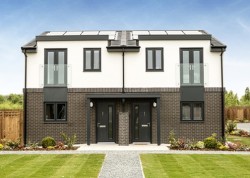Offsite construction represents an opportunity to deliver on new targets for carbon reduction, writes Wayne Gales.
Making homes in a factory sounds clinical and cold but it should be warmly welcomed.
The reason being is that it gives the sector the opportunity to create a wishlist of what it wants to include in order to future-proof homes for generations to come.
JV North, a consortium of housing associations formed in 2007 to create economies of scale when bidding for government homebuilding grant and procuring works, has launched a task and finish group to see how we can push the boundaries of what is currently being built offsite.
We reason that if we're innovating by looking at modern methods of construction (MMC), let's really explore what can be achieved.
As a bear minimum we want great quality, efficiency of build and homes that meet the highest fire safety standards, the latter is non-negotiable regardless of the size of the property or how homes are made.
How quickly we can build is obviously important otherwise we would carry on building traditionally, but it's not speed in isolation that we are looking at.
What really excites our members' boards is exploring how we can make new homes eco-friendly as possible, both to construct and live in.
Development staff from across the consortium are currently looking at how factories can meet these environmental aspirations.
We want to take the opportunity of innovating with modular homes to aim for sector-leading MMC standards through intelligent design, being heavily insulated and using recycled materials.
The task and finish group is also trying to identify a single provider the consortium can work with over several years to overcome habitual problems that are preventing more homes being built offsite.
It's important we consider timescales, cost, quality, procurement, confidence and warranty issues to see the adjustments that can be made to streamline the supply of new homes built in this way.
A big advantage to us is that we are drawing on excellent hands-on experience.
Our members have held a keen interest in modular housing for a number of years, with many undertaking independent projects – all of which have been well received.
JV North members Jigsaw, Torus, Trafford Housing Trust and Wythenshawe Community Housing Group have all completed modular projects in recent years.
Jigsaw (then New Charter Homes) delivered the first offsite scheme in social housing to receive grant funding.
Torus built a 33-home development in Naylorsfield Drive – the biggest single MMC scheme in the sector at the time – and is currently manufacturing 10 modular homes for land in St Helens.
More recently, Wythenshawe Community Housing Group and Trafford Housing Trust have used modular methods to build on small, awkward sites like disused garage plots.
We're looking at these completed schemes and the industry as a whole to identify what was successful, what can be improved and seek solutions.
The main form of heat loss in homes comes from ventilation and draughts, but with well-sealed shells the difference in tenants' fuel bills will be significant.
The importance of building sustainably is well known and we want to push this, given that 14% of the total UK emissions come from energy use in the home.
A greener focus could offset this and quickly too if we can get a bigger group of like-minded organisations to offer manufacturers and supply chains continuity of programme.
We'll be looking at whether there are opportunities for JV North to partner a modular contractor in a more formal way.
Through traditional construction, the consortium is already delivering the equivalent of an incredible 3.5 new homes every working day for the Shared Ownership Affordable Homes Programme.
We want any alignment with a modular provider to enhance this further.
We will be reporting our findings in due course but the door is always open to forward-thinking organisations that can help us achieve our ambitions.
Change very rarely happens in isolation and we have more chance of tackling the housing crisis together.









